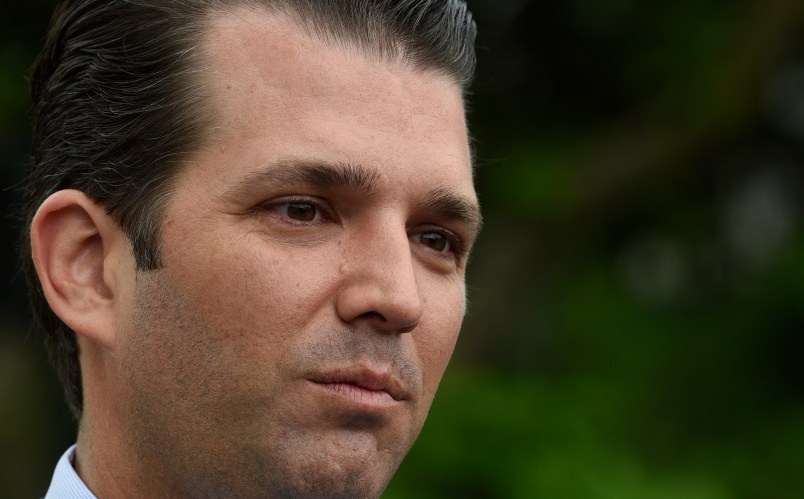The unredacted version of special counsel Robert Mueller’s report released on Thursday reveals that while the Mueller team “considered” charging Donald Trump Jr. and other campaign officials who attended the infamous June 2016 Trump Tower meeting, Mueller’s team concluded that they did not have enough evidence to file any charges.
In the redacted report, Mueller laid out that the events surrounding the meeting could implicate an elections law ban on receiving contributions from foreign nationals. The report states that there are “reasonable arguments” that the offer of damaging information on Clinton would constitute a campaign contribution under the relevant elections law provision.
Yet, the Mueller team concluded that two factors would prevent them from meeting the burden of proof required to file charges.
The first was that they felt they did not have enough evidence to prove that the Trump campaign officials involved in planning and attending the meeting were acting “willfully,” which the report defines as having “general knowledge of the illegality of their conduct.” Mueller’s investigators were unable to find “evidence that the participants in the meeting were familiar with the foreign-contribution ban,” according to the redacted report.
The report adds that Trump Jr. “could mount a factual defense that he did not believe his response to the offer and the June 9 meeting itself violated the law,” and that Jared Kushner could use a similar defense given he was not as involved in setting up the meeting. Mueller’s team also noted that “while [Paul] Manafort is experienced with political campaigns, the Office has not developed evidence showing that he had relevant knowledge of these legal issues.”
Mueller’s team does note in the redacted report that while they have evidence of attempts to hide the meeting, they did not find “strong evidence” that those involved tried to conceal the meeting around the time it took place. Because these attempts to hide the meeting occurred much later and included people who did not attend the meeting, those efforts “may reflect an intention to avoid political consequences rather than any prior knowledge of illegality.”
The Mueller team secondly concluded they would struggle to “prove beyond a reasonable doubt” that the promise of dirt on Clinton would constitute a campaign contribution. The report explains that while previous rulings suggest, in the Mueller team’s view, that the promise of opposition research on an opponent would constitute a contribution, no U.S. judge has yet ruled on that specifically and it’s unclear how courts would resolve the question. The report also notes that the Mueller team believed they would struggle to prove that the promise of information would exceed the $2,000 criminal threshold for a felony violation or the $25,000 threshold for felony punishment.
“Accordingly, taking into account the high burden to establish a culpable mental state in a campaign-finance prosecution and the difficulty in establishing the required valuation, the Office decided not to pursue criminal campaign-finance charges against Trump Jr. or other campaign officials for the events culminating in the June 9 meeting,” the report reads.







In other words, Traitor Tot is one of many useful idiots in the Drumpf orbit.
Like the Twinkie Defense, except it worked this time?
So Junior is ignorant of the law… got it.
As surprising as finding Sanders told known lies…
Oh good. So if I don’t know I am breaking the law I go ahead and break the law no one will charge me of anything. Got it.
I don’t do criminal law, but in other areas of the law, “willful” means doing an act willingly and knowingly, and does not depend on knowing that it is unlawful. “Ignorance of the law is no excuse.”